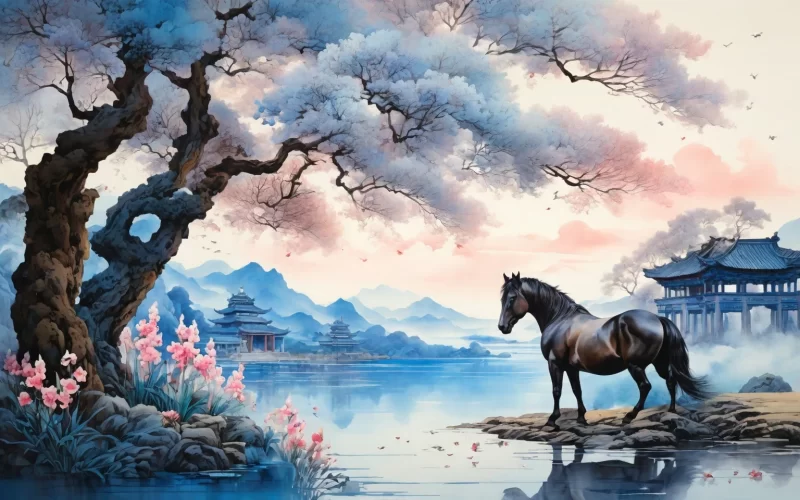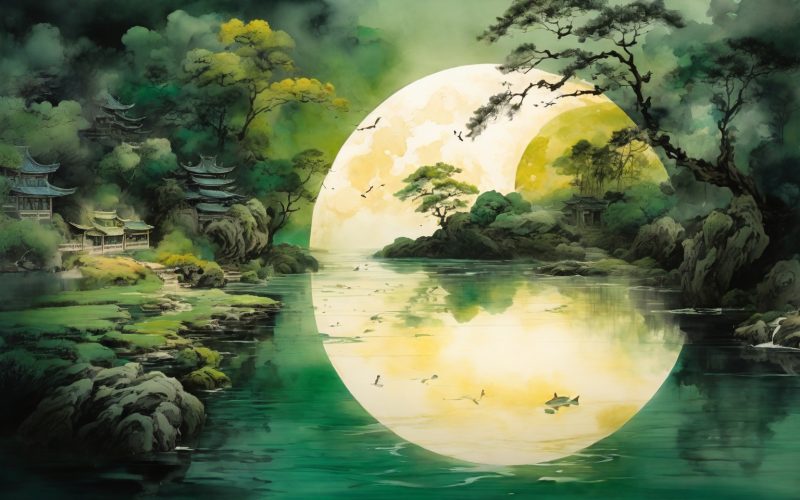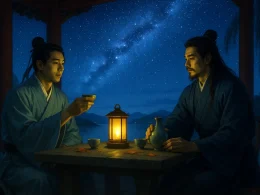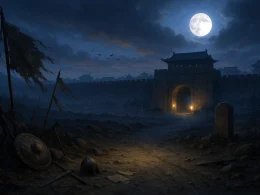West of Jia Pavilion and north of Lonely Hill,
Water brims level with the bank and clouds hang low.
Disputing for sunny trees, early orioles trill;Pecking vernal mud in,
young swallows come and go.A riot of blooms begins to dazzle the eye;
Amid short grass the horse hoofs can barely be seen.
I love best the east of the lake under the sky;
The bank paved with white sand is shaded by willows green.
Original Poem:
「钱塘湖春行」
白居易
孤山寺北贾亭西,水面初平云脚低。
几处早莺争暖树,谁家新燕啄春泥。
乱花渐欲迷人眼,浅草才能没马蹄。
最爱湖东行不足,绿杨阴里白沙堤。
Interpretation:
This poem was composed by the Tang Dynasty poet Bai Juyi during his visit to West Lake in Hangzhou, depicting the beauty of early spring there. Bai Juyi once served as the governor of Hangzhou, and the emotions in this poem reflect his deep affection for West Lake and his appreciation of its natural beauty. Through vivid descriptions of spring scenery, the poet conveys a sense of inner tranquility and joy while also expressing his admiration for nature. West Lake’s stunning landscape was well known during the Tang Dynasty, and through this poem, Bai Juyi seamlessly merges the beauty of nature with personal emotions, showcasing the delicate sensitivity and life philosophy of Tang poets.
First Couplet:“孤山寺北贾亭西,水面初平云脚低。”
From the north of Gushan Temple to the west of Jia Pavilion, the spring water has just risen, making the lake level with the embankment. The low-hanging clouds touch the water’s surface, creating a harmonious scene.
These lines depict the calm water and low-floating clouds, highlighting the tranquility and ethereal beauty of West Lake. The blending of clouds and lake enhances the sense of openness and vastness, setting a serene and expansive tone for the poem.
Second Couplet:“几处早莺争暖树,谁家新燕啄春泥。”
A few early orioles compete to perch on the warm branches, while newly arrived swallows busily peck at the spring mud to build their nests.
These lines illustrate the vitality of spring. Orioles and swallows, as messengers of the season, bring an atmosphere full of life and energy. By portraying the activities of these birds, the poet conveys the essence of spring and its dynamic renewal.
Third Couplet:“乱花渐欲迷人眼,浅草才能没马蹄。”
The scattered blossoms gradually overwhelm the eyes with their dazzling colors, while the newly sprouted grass is just tall enough to partially cover the horses' hooves.
This couplet, through keen observation of flowers and grass, presents the richness of spring colors and its vibrancy. Although the flora is not yet in full bloom, the scenery of early spring is already enchanting, showcasing the poet’s delicate perception of nature.
Fourth Couplet:“最爱湖东行不足,绿杨阴里白沙堤。”
I am most fond of strolling along the eastern shore of the lake, where the white sand embankment winds gracefully beneath the shade of green willows.
These lines express the poet’s deep admiration for the eastern part of West Lake. The white sand embankment, nestled in the shadow of verdant willows, exudes a sense of serenity and beauty. Immersed in such scenery, the poet finds great joy and is reluctant to leave.
Writing Style:
Bai Juyi’s poetic style is characterized by simplicity, clarity, and freshness, all of which are evident in this poem. Using concise yet vivid language, he paints a lively picture of West Lake’s spring landscape. The imagery flows naturally without excessive ornamentation, yet the reader can still deeply feel the poet’s affection for nature. Bai Juyi skillfully weaves personal emotions into his depiction of the scenery, making the poem not only visually captivating but also emotionally resonant. Additionally, the use of contrast—between stillness and movement, scenery and sentiment—adds depth and rhythm to the poem.
Overall Appreciation:
Bai Juyi’s A Spring Outing at Qiantang Lake is a highly picturesque poem that beautifully captures the springtime charm of West Lake through delicate imagery. The poem unfolds in a structured manner: the first couplet portrays the serene landscape of the lake, the second highlights the lively presence of birds, and the third focuses on flowers and grass, gradually intensifying the sense of seasonal beauty. Finally, the concluding couplet expresses the poet’s admiration and reluctance to leave this idyllic setting. Through simple yet evocative language, Bai Juyi conveys a profound love for nature and a heartfelt appreciation for spring. At the same time, the poem reflects his refined sensibility and the joy he finds in immersing himself in scenic landscapes.
Insights:
This poem teaches us the importance of observing and cherishing nature with sincerity and attentiveness. It encourages us to slow down and appreciate the beauty around us, finding tranquility and vitality in the natural world. The images in the poem go beyond mere descriptions of scenery—they serve as a form of spiritual nourishment. Through this approach, Bai Juyi allows us to experience the harmony between nature and the human heart, as well as the energy and hope that spring brings. In our daily lives, we should learn to draw strength from nature, savor its delicate yet enchanting moments, and embrace the serenity and joy of coexisting with the natural world.
Poem translator:
Xu Yuan-chong (许渊冲)
About the poet:
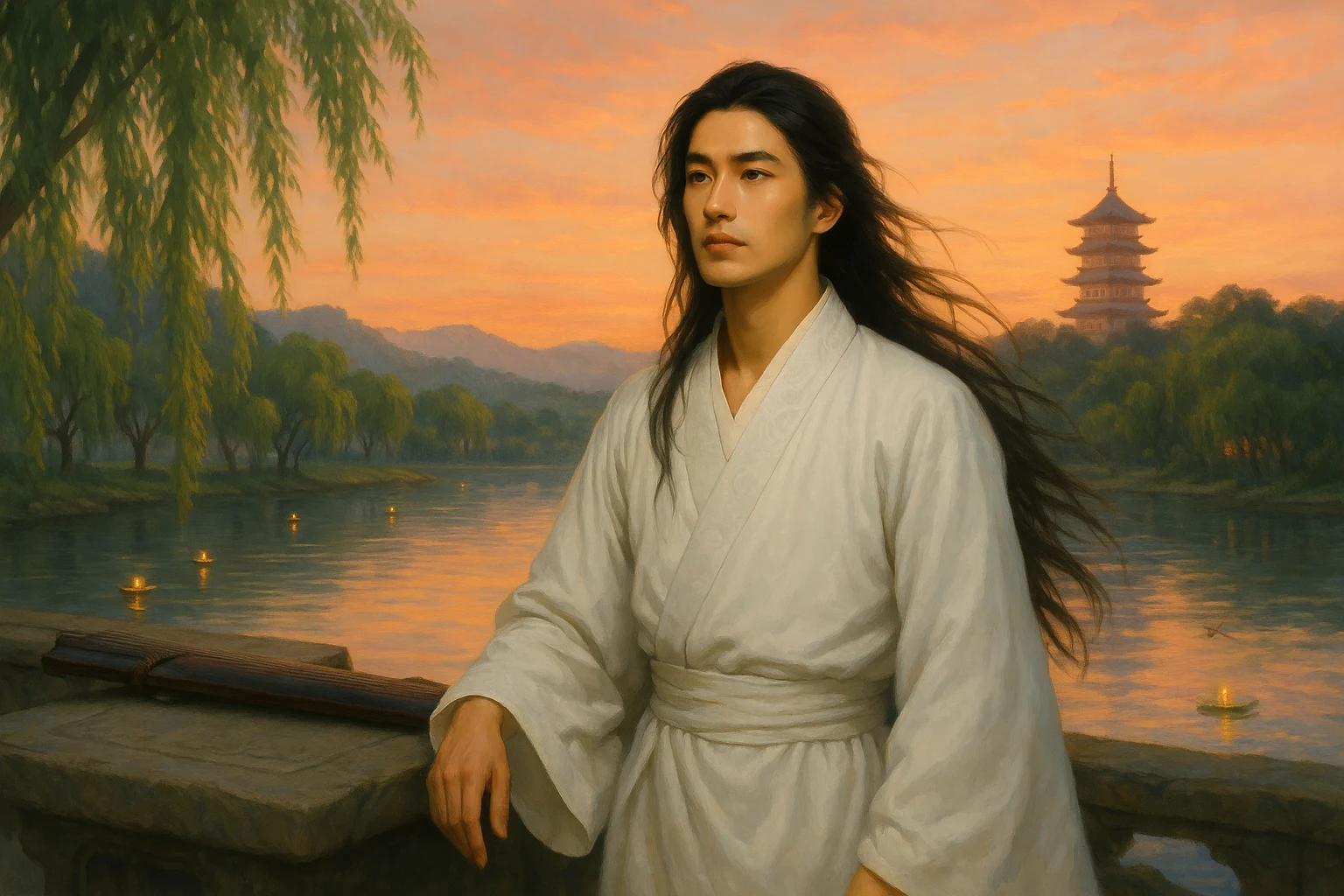
Bai Juyi (白居易), 772-846 AD, was originally from Taiyuan, then moved to Weinan in Shaanxi. Bai Juyi was the most prolific poet of the Tang Dynasty, with poems in the categories of satirical oracles, idleness, sentimentality, and miscellaneous rhythms, and the most influential poet after Li Bai Du Fu.






